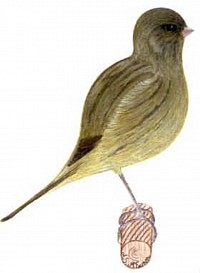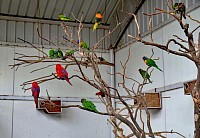Bridlington Parrot Sanctuary
Stop the Caging of Birds!
Published 12 December 2017
Caged birds often experience significant suffering and stress when confined alone in small cages, especially if they do not receive sufficient time out of their cage. These birds naturally desire to fly freely and socialize with other birds, not spending their entire lives isolated in cramped cages.
Parrots and other birds kept in cages continuously, may sleep during the day as a way to cope with boredom. While others, might start over-preening, progressing to feather plucking, and eventually leading to feathers that fail to regrow.
In more severe cases, some parrots may even self mutalate their own skin. Birds in this condition may become much harder to rehome, and living outside in an aviary or sanctuary may no longer be a option for them.
If your parrot has started plucking its feathers, we recommend consulting this helpful guide: www.beautyofbirds.com
We need to stop the suffering: Avoid keeping birds caged all the time.
Please think seriously about constructing an aviary or a dedicated bird room inside your home, or an outdoor aviary in your garden, to provide your birds with plenty of space. Alternatively, you can acquire a larger double parrot cage, or combine multiple large cages by removing the dividers to create a more spacious environment.
When your parrot is in its cage, try to keep the door open as much as possible. The cage should primarily serve as a safe place for the bird to eat, sleep, play, and a secure refuge when you cannot supervise your bird.
Allowing your birds plenty of time outside the cage each day is crucial. We recommend opening the cage door for a minimum of six hours, or more every day. This time can be split into two sessions—one during the day and another in the evening—or arranged in a way that suits your schedule. Providing this freedom for your birds to leave the cage, helps prevent many behavioral issues that can arise from not receiving proper care.
This guidance should apply to all caged birds, including budgerigars, lovebirds, canaries, and finches. Please avoid keeping them confined all day. When birds are free, they typically return to their cages to eat and feel secure, as cages offer a sense of safety. Letting them out daily should become standard practice. It is time to change our perspective on keeping birds in cages.
We must acknowledge that birds should not be kept alone in cages.
For further information, please visit: www.thedodo.com
So what if your bird refuses to leave its cage, here is some advice: https://beautyofbirds.com
Important Considerations for Bird Owners
We’re not saying you shouldn’t keep birds as pets; rather, we want to ensure they receive the care and attention they truly deserve.
It is really important to make sure your birds have plenty of social interaction with other birds and engaging activities to keep them entertained. Provide hanging toys, foraging toys, chewable items, and a cage equipped with a platform and play station. Whenever possible, consider keeping more than one bird together. This will help your feathered friends stay happier and less dependent on you. For additional ideas, visit our Parrot Entertainment page.
However, if you do not plan to build an aviary or allow your bird out of its cage, and intend to keep it alone in a small cage for its entire life, then it is not advisable to keep a bird as a pet. Such confinement is a form of animal cruelty and neglect. Instead, you should consider rehoming your bird to live in a private aviary, a local sanctuary, or a bird park.
All Birds Should Have Companions—Never Be Kept Alone
If you own a pet bird, you have likely considered getting your bird a companion. Whether this is the right choice depends on several factors, according to experts.
Most pet birds and parrots thrive best in pairs, which is often the ideal long-term arrangement. Some species require the full interaction of a flock, similar to their natural wild environment.
We encourage you to consider adding one or more birds to keep your pet company—especially if your bird was parent-reared—so it is never lonely when you are not around.
If a rehoming charity or breeder offers you a single, non-tame, parent-reared bird, you should question their expertise. A responsible seller understands that a lone bird will likely lead a very sad, lonely, and unfulfilled life.
Mixing Different Bird Species
Many people wonder if different bird species can live together peacefully. There are no strict rules about which species can cohabit, but some helpful guidelines exist. For more information, please visit: www.exoticdirect.co.uk
What Needs to Change
We urgently need to build more bird sanctuaries, bird parks, and private aviaries run by people who genuinely care about birds suffering alone in tiny cages.
We also want to encourage pet store owners to act more responsibly by promoting aviary construction and selling aviary panels instead of small cages.
Thinking of Rehoming Your Birds?
If you are thinking about rehoming your bird to a sanctuary and want to explore this option—rather than selling or rehoming it to live alone in a cage—we are here to assist you.
We can provide a list of bird sanctuaries and bird parks in your area, some of which may even allow you to visit your bird. For more information, please Contact Us.


